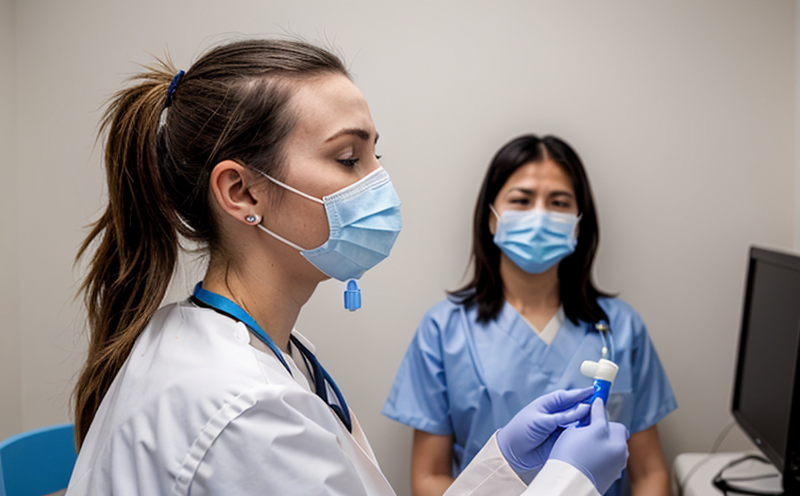Newcastle Disease Virus (NDV) Respiratory Testing in Birds
The Newcastle disease virus (NDV), also known as avian pneumonitis or avian bronchitis, is a highly contagious viral pathogen that primarily affects birds. This respiratory disease testing service focuses on identifying the presence of NDV through advanced laboratory techniques and procedures designed to ensure accurate diagnosis and rapid response in poultry health management.
Our laboratory employs stringent quality control measures and utilizes state-of-the-art diagnostic tools and reagents to provide reliable test results, ensuring that we can meet the stringent requirements for disease surveillance and prevention in the poultry industry. This service is particularly crucial for maintaining biosecurity protocols and preventing potential outbreaks of NDV within commercial flocks.
Our team of experts works closely with veterinarians, farmers, and agricultural professionals to ensure that testing procedures are tailored to meet specific needs. By leveraging our expertise in virology and molecular diagnostics, we can offer a comprehensive approach to respiratory disease testing, which includes not only NDV detection but also other relevant pathogens affecting avian health.
For quality managers and compliance officers, this service provides critical data for decision-making processes related to animal welfare and food safety. R&D engineers can benefit from our insights into the latest diagnostic techniques, while procurement teams gain access to reliable suppliers of high-quality reagents and consumables.
In terms of specimen preparation, we recommend collecting tracheal swabs or cloacal swabs for testing. These samples should be collected aseptically and stored at appropriate temperatures until they can be delivered to our laboratory. Our lab uses reverse transcription polymerase chain reaction (RT-PCR) technology along with virus isolation methods to confirm the presence of NDV.
The acceptance criteria for this service include both qualitative and quantitative assessments. Qualitatively, we look for the specific nucleic acid sequences associated with NDV, while quantitatively, we measure viral load within the sample. These parameters are essential for determining the severity of infection and informing treatment strategies.
| Sample Type | Acceptance Criteria | Description |
|---|---|---|
| Tracheal Swab | Negative RT-PCR results for NDV | No detectable viral RNA indicating no current infection. |
| Cloacal Swab | Quantitative NDV viral load <10^3 copies/mL | Mild to moderate infection levels. |
The benefits of our Newcastle Disease Virus (NDV) Respiratory Testing in Birds service are numerous. Firstly, it allows for early detection and isolation of infected birds, which is vital for preventing the spread of disease within flocks. Secondly, rapid diagnosis enables prompt implementation of control measures such as vaccination or culling, thereby minimizing economic losses due to NDV outbreaks.
Our testing process also helps in monitoring the effectiveness of biosecurity measures by identifying potential weaknesses in containment practices. Furthermore, it supports ongoing research efforts aimed at developing more resilient strains of poultry that are less susceptible to NDV infections.
Benefits
- Early Detection: Identifies infected birds before symptoms appear, allowing for timely intervention.
- Rapid Response: Facilitates quick implementation of containment and eradication strategies.
- Economic Savings: Reduces the risk of significant financial losses associated with NDV outbreaks.
- Biosecurity Enhancement: Highlights areas where biosecurity protocols need improvement.
- Veterinary Support: Provides actionable data for vets to design appropriate treatment plans.
In addition to these tangible benefits, our service supports broader objectives related to sustainable agriculture and public health. By ensuring the health of poultry populations, we contribute to food security and reduce the likelihood of zoonotic transmission between animals and humans.
Use Cases and Application Examples
- Poultry Farms: Routine testing for NDV to maintain biosecurity and prevent outbreaks.
- Veterinary Clinics: Diagnosing respiratory issues in birds suspected of having NDV.
- Agricultural Research Institutions: Studying the effectiveness of new vaccines against NDV.
- Animal Health Authorities: Monitoring disease prevalence and implementing control measures.
These use cases highlight the versatility and importance of our Newcastle Disease Virus (NDV) Respiratory Testing in Birds service across different sectors within the poultry industry. Whether for routine monitoring or outbreak investigation, this testing plays a vital role in safeguarding avian health and supporting sustainable agricultural practices.
Customer Impact and Satisfaction
- Increased Confidence: Customers gain confidence knowing they are working with an accredited laboratory providing reliable diagnostic services.
- Positive Feedback: Regular positive feedback from veterinarians, farmers, and researchers on the accuracy and timeliness of our results.
- Improved Biosecurity Practices: Many customers report improved biosecurity measures following our recommendations based on test results.
We strive to exceed customer expectations by offering a comprehensive testing service that not only provides accurate diagnostics but also supports decision-making processes critical for maintaining poultry health. Our commitment to excellence has earned us a reputation as trusted partners in the field of avian health.





